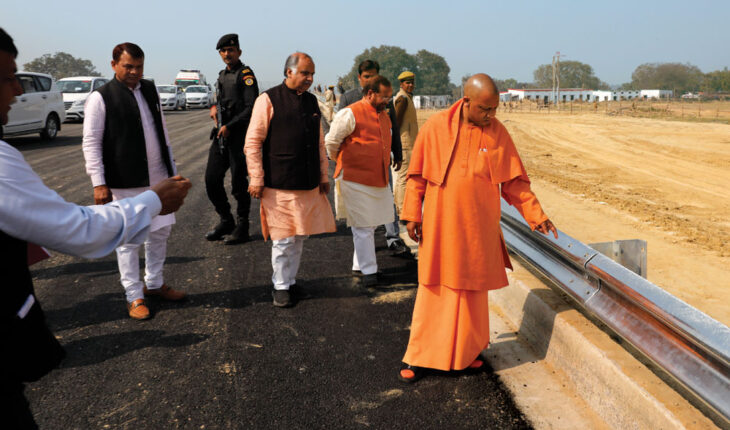Meerut : CM Yogi Adityanath, on Tuesday inspected the construction of the Delhi – Ghaziabad – Meerut RRTS corridor at Bhaisali, Meerut. He took stock of the ongoing construction activities being carried out on the entire corridor and inspected tunnelling activities at Bhaisali, Meerut.
NCRTC had set up a photo exhibition at the venue showcasing the pace of the project implementation of India’s first RRTS corridor. The photo exhibition depicted the three-years journey of Delhi-Ghaziabad-Meerut RRTS corridor right from the foundation stone laying by the Hon’ble Prime Minister of India, Shri Narendra Modi to the recent rolling out of the first trainsets from Savli, Gujrat.
It also showcased the significant progress made on the 17 KM priority section in a short span and various milestones achieved by NCRTC in the past three years.
Managing Director, NCRTC, Vinay Kumar Singh, iin a walkthrough of the photo exhibition, apprised the Chief Minister on various aspects of the project including the accomplishments made during the project execution and how NCRTC is leveraging various technologies in project implementation.
The Chief Minister acknowledged the way NCRTC is implementing this transformational project with diligence and by adopting new edge technologies. He was also contented to note the pace of construction of the Delhi-Ghaziabad-Meerut RRTS corridor despite the three waves of COVID.
Chief Minister during his visit to the Bhaisali station keenly observed the tunnelling work being undertaken at the station.
Four Tunnel Boring Machines (TBMs – Sudarshan) are to be lowered at Bhaishali for making tunnels in the both directions of Meerut South and Begumpul stations. In these, one TBM has already started working for making of longest tunnel of Meerut of around 2 km from Bhainsali to Meerut Central. The second TBM is also being assembled at this location for making second tunnel from Bhansali to Meerut Central.
The Bhaishali is only station in Meerut where four tunnel boring machines will simultaneously work to make tunnels.
The 82km long Delhi-Ghaziabad-Meerut RRTS corridor will have 25 stations including two depot stations on the Delhi-Ghaziabad-Meerut RRTS corridor. Local transit services will be provided on the RRTS network in Meerut. With 13 stations in the span of 21 km for the local transit needs.
The construction work on the 17 km priority section between Sahibabad to Duhai is progressing at a rapid speed. The construction of the viaduct of the priority section is nearing completion and the installation of signalling and telecom systems is also being undertaken.
The priority section will have a total of 5 stations, Sahibabad, Ghaziabad, Guldhar, Duhai and Duhai Depot, and their construction work is in progress. The road ahead for the implementation of Over Head Electrical wires is now clear and the track laying work is being carried out within its stipulated time frame. The construction work of stabilizing and inspection lines and rolling stock maintenance yard for maintenance of RRTS trains at Duhai Depot is also on track.
The construction of the administrative building of RRTS equipped with various labs, simulation rooms and different types of classrooms being built for training is also underway.
At present 23 launching gantries (Tarini) have been installed on the 82 km long Delhi-Ghaziabad-Meerut corridor and the speed with which this project is being carried out is exemplary for the construction of any urban transport infrastructure project in the country. NCRTC is targeting to start the operation on the priority section by early next year and commission the entire corridor by 2025.





